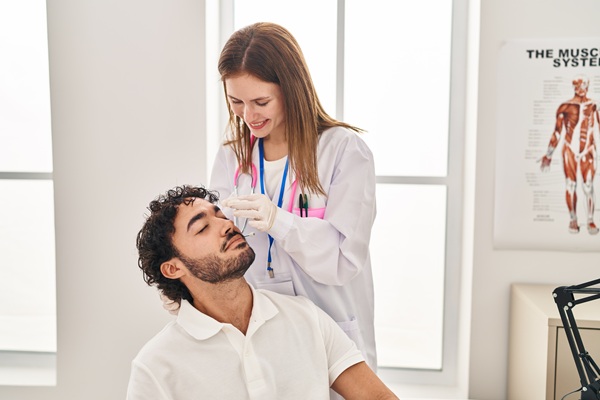What to Expect During an Eye Exam

If you have never had an eye exam before, then you may be a little nervous and not know what to expect on your first visit to the optometrist. By gaining a full understanding of what an eye exam consists of, then you can stay calm and remain confident on the day of the examination.
How an eye exam works
Although each eye exam may be slightly different depending on the optometrist and the patient’s exact needs, there are certain tasks that are a part of almost every eye exam. The following is a three-step process that most medical professionals follow when conducting an eye exam.
Determine medical history
The first step in the eye exam process is for the examiner to document the patient’s medical history, discussing anything relevant to eye health and any eye complications that the patient may have recently experienced. The patient is likely to be asked a series of questions, which may include inquiries about any family members who have developed an eye disease in the past if the patient is currently suffering from any eye conditions and more general questions about their overall health. This knowledge allows the examiner to gain a better understanding as to what exact eye exam tests are needed.
Eye exam tests
The eye exam tests performed may be different for each patient, but there are some that are more common. Almost every eye exam includes what is known as a visual acuity test, which measures the sharpness of the patient’s vision. Most people are familiar with and have received this form of exam — which often uses the famously known wall chart that contains various rows of letters. Tonometry, which measures the pressure in the eyes, is also a common procedure. In many instances, a pupil dilation test may be performed as well in order to see the internal structure of the eyes more clearly.
Evaluation and treatment
After the testing is complete and the results are available, the medical professional conducting the eye exam is likely to go over the results with the patient. If any eye complications were determined, she or he may recommend treatment to the patient, which can range from contacts or glasses to treatment for glaucoma and other more serious eye conditions. In the event that the patient’s eyes are healthy, the medical professional is likely to discuss preventive techniques to ensure a healthy eye exam on the next visit as well; these suggestions may include lifestyle or diet changes.
Schedule an eye exam today
It is important to receive consistent eye exams, regardless of if you experience any eye issues or not. The symptoms of many serious eye conditions can go unnoticed for a long time and cause the issue to be much harder to treat when more noticeable symptoms develop. A skilled optometrist is able to identify the earliest signs of eye disease and other serious eye complications, in addition to helping patients see and feel better every day. If you are in need of an eye exam, then feel free to consult with us today and schedule a time to come in for a visit.
Request an appointment here: https://www.texasoptical.net or call Texas Optical at (214) 771-7333 for an appointment in our Dallas office.
Check out what others are saying about our services on Yelp: Read our Yelp reviews.
Recent Posts
Dry eye treatment is important when occasional irritation becomes ongoing discomfort that interferes with daily activities. Many individuals experience dryness, burning, or a gritty feeling in the eyes from time to time. However, when symptoms start to affect reading, screen use, or time outdoors, a structured approach to diagnosis and care helps protect comfort and…
Myopia control focuses on slowing the progression of nearsightedness, primarily in children and teens, to help protect long-term eye health and day-to-day vision. Myopia occurs when the eye grows too long or the cornea curves too steeply, which causes distant objects to appear blurry. As the prescription increases, the risk of future eye disease also…
Retinal photography gives optometrists a detailed view of the back of the eye. When done regularly, they are often able to spot early signs of disease before symptoms affect daily vision. This advanced imaging tool helps create a clear record of eye health over time and supports smarter decisions about treatment and follow-up care. Learning…
Red, itchy eyes can affect your everyday comfort and reduce overall well-being. It is important to seek effective vision care from the first sign of irritation. Proper attention to symptoms, underlying causes, and healthy habits ensures stronger long-term eye health and greater day-to-day clarity. Redness and itchiness often stem from several common triggers. These include: Allergic…


